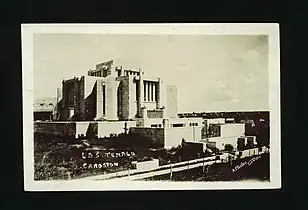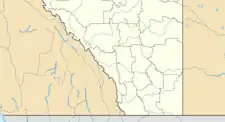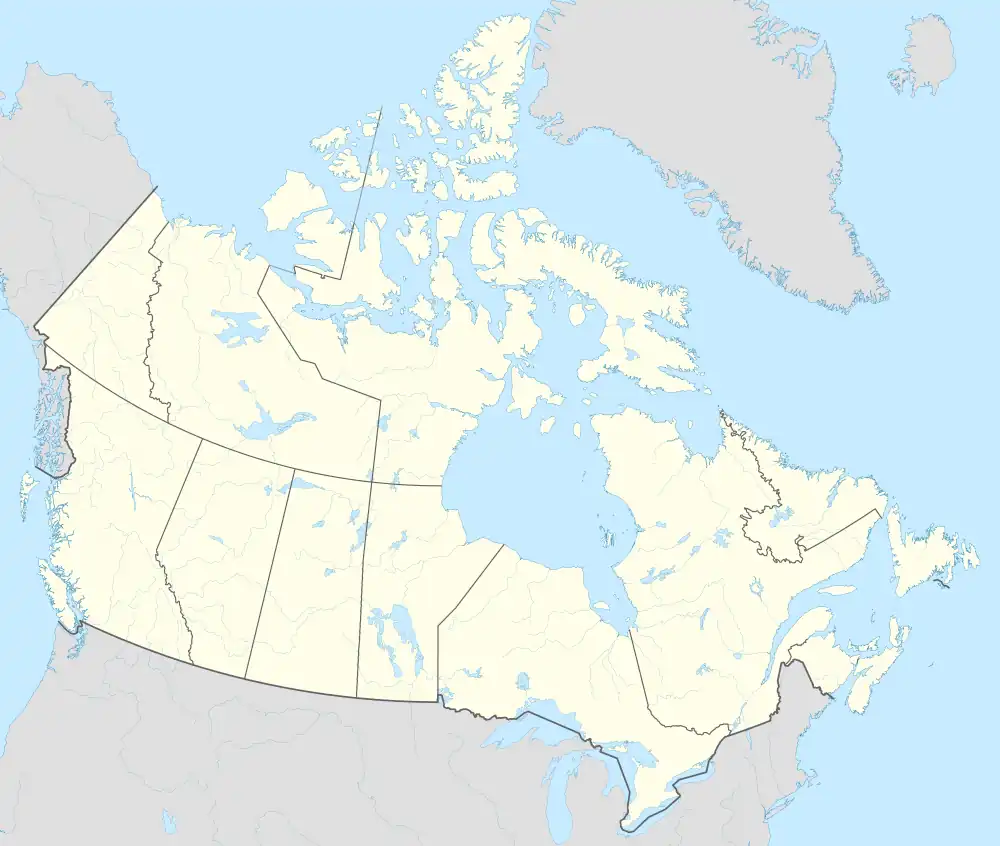| Cardston Alberta Temple | ||||
|---|---|---|---|---|
 | ||||
| Number | 6 | |||
| Dedication | August 26, 1923, by Heber J. Grant | |||
| Site | 10 acres (4.0 ha) | |||
| Floor area | 88,562 sq ft (8,227.7 m2) | |||
| Height | 85 ft (26 m) | |||
| Official website • News & images | ||||
| Church chronology | ||||
| ||||
| Additional information | ||||
| Announced | June 27, 1913, by Joseph F. Smith | |||
| Groundbreaking | November 13, 1913, by Daniel Kent Greene | |||
| Open house | Tours offered, 1920–23 June 6–15, 1991 (after renovation) | |||
| Rededicated | July 2, 1962, by Hugh B. Brown June 22, 1991, by Gordon B. Hinckley | |||
| Current president | F. Brent Thomas[1] | |||
| Designed by | Hyrum Pope and Harold W. Burton | |||
| Location | Cardston, Alberta, Canada | |||
| Geographic coordinates | 49°11′52.23840″N 113°18′32.50800″W / 49.1978440000°N 113.3090300000°W | |||
| Exterior finish | White granite | |||
| Baptistries | 1 | |||
| Ordinance rooms | 4 (four-stage progressive) | |||
| Sealing rooms | 5 | |||
| Clothing rental | Yes | |||
| Visitors' center | Yes | |||
| Notes | An addition was completed in 1962 and was dedicated on July 2, 1962 by Hugh B. Brown. | |||
| () | ||||
| Cardston Alberta Temple | |
|---|---|
| Location | Cardston, Southern Alberta, Alberta, Canada |
| Area | 10 acres (40,000 m2) |
| Founded | June 27, 1913 |
| Built | 1913–1923 |
| Architectural style(s) | LDS temple |
| Governing body | The Church of Jesus Christ of Latter-day Saints |
| Website | Official LDS Cardston Alberta Temple page |
| Designated | 1992 |
The Cardston Alberta Temple (formerly the Alberta Temple) is the eighth constructed and sixth of the still-operating temples of the Church of Jesus Christ of Latter-day Saints. Located in Cardston, Alberta, it is the church's oldest temple outside the United States. It is one of eight temples that does not have an angel Moroni statue, and one of six without spires, similar to Solomon's Temple.[2] It is also one of only two temples the church built in the shape of a cross, the other being the Laie Hawaii Temple.

History
The temple was announced on June 27, 1913, and was built on Temple Hill, an eight-acre plot given to the church by Charles Ora Card. The site expanded to more than 10 acres (4.0 ha) in the mid-1950s. The granite used in building the temple was hand-hewn from quarries in Nelson, British Columbia.
Originally dedicated on August 26, 1923, by church president Heber J. Grant,[3] an addition was rededicated on July 2, 1962, by Hugh B. Brown. The first temple president was Edward J. Wood, who served from 1923 to 1948. The temple was renovated in the 1990s, and Gordon B. Hinckley rededicated it on June 22, 1991.
The temple has four ordinance rooms, five sealing rooms, and a floor area of 88,562 square feet (8,227.7 m2).
In 1992, the temple was declared a National Historic Site, and a plaque was dedicated in 1995.[4]
In 2020, like all the church's other temples, the Cardston Alberta Temple was closed in response to the coronavirus pandemic.[5]
Presidents or matrons
Other than Wood, other notable temple presidents, or matrons, include Merlin R. Lybbert (1994–97); Elaine L. Jack (1997–2000); and Ardeth G. Kapp (2000–03).

See also
|
Temples in Alberta ()
|
- Comparison of temples of The Church of Jesus Christ of Latter-day Saints
- Torleif S. Knaphus — sculpted the large bas relief titled Christ the Fountainhead on the exterior of the building and also the life-size oxen holding the baptism font
- LeConte Stewart - painted murals and other art work in the temple
- List of National Historic Sites of Canada in Alberta
- List of temples of The Church of Jesus Christ of Latter-day Saints
- List of temples of The Church of Jesus Christ of Latter-day Saints by geographic region
- Temple architecture (Latter-day Saints)
- The Church of Jesus Christ of Latter-day Saints in Canada
References
- ↑ "New Temple Leaders Called to Serve in 2022", Newsroom, LDS Church, 24 October 2022 [26 May 2022], retrieved 24 October 2022
- ↑ The other five are the Laie Hawaii, Mesa Arizona, Paris France, Meridian Idaho, and Lima Peru Los Olivos temples.
- ↑ Grant, Heber J. (October 1923), "Prayer offered at the Dedication of the Alberta Temple, at Cardston, Canada, August 26, 1923", Improvement Era, 26 (12): 1075–1081
- ↑ "Temple of the Church of Jesus Christ of Latter Day Saints National Historic Site of Canada", Canadian Register of Historic Places
- ↑ Stack, Peggy Fletcher. "All Latter-day Saint temples to close due to coronavirus", The Salt Lake Tribune, 26 March 2020. Retrieved on 28 March 2020.
Further reading
- Anderson, Paul L. (July 1977), "First of the Modern Temples", Ensign
- Gates, Susa Young (October 1923), "Dedication of the Alberta Temple", Improvement Era, 26 (12): 1139–1141
- Jenson, Andrew (October 1923), "Elder Andrew Jenson (Assistant Church Historian.)", [General] Conference Report, pp. 125–132
- Anderson, Paul L. (July 1978), "Paintings from the Alberta Temple", Ensign
- Brown, Hugh B. (August 1962), "The LDS Concept of Marriage", Improvement Era, 65 (8): 570–575 (Has accompanying color photographs of interior of Cardston Alberta Temple)
- Steele, C. Frank (August 1962), "Trek to the North", Improvement Era, 65 (8): 568–569, 590–591
External links
- Cardston Alberta Temple Official site
- Cardston Alberta Temple at ChurchofJesusChristTemples.org
- Augustine, Nathan. "The Cardston Alberta Temple". Nathan's Exhaustive Guide to the Temples of the Church of Jesus Christ of Latter-Day Saints. Archived from the original on 2006-02-10. Retrieved 2006-12-26.


